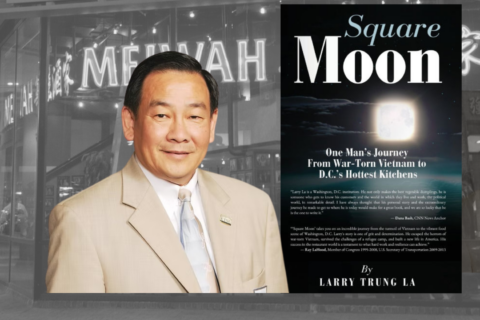This story was written as part of the WTOP Book Report series written by Terik King. Read more of that coverage.

In her riveting debut novel, My Name Was Eden (HarperCollins), UK-based author Eleanor Barker-White channels the profundity of life into art by telling the tale of a mother named Lucy, and her struggle after her teenage daughter, Eden, survives a near-fatal drowning incident and returns claiming to be Eli, the name reserved for Eden’s unborn twin who vanished during pregnancy.
As Barker-White told the WTOP Book Report, the seed of the story was rooted in her own experience with the real-life phenomenon of vanishing twin syndrome.
“When I was pregnant with my son, Ethan, he was a twin,” Barker-White explained. “At the first scan, there were two hearts beating, but at the next scan, about eight weeks later, they said one had vanished. I had to get my head around that, and I started wondering where the twin had gone … the fact that it had been absorbed by my surviving twin was just weird.”
But then, she continued, “I started (thinking about) what the effects could be if this twin came back. That was where the seed of it came from.”
When Eden emerges from the incident without a scratch, she soon begins asserting that her name is Eli — her unborn fraternal twin brother — unsettling her mother with a steady demeanor and strange new smile. Lucy’s husband, James, and their doctor dismiss her concerns, but Lucy remains convinced that the daughter she knew is gone.
The story’s emotional core centers around the complexities of the parent-child relationship and the impact of unresolved trauma.
“Lucy always hankered after the lost twin, especially because she never really had much of a relationship with Eden,” Barker-White noted.
The drowning incident serves as the catalyst for exposing deeper fissures in Lucy and James’ marriage, forcing them to confront past traumas and the strain on their relationship.
“They were butting heads from the beginning,” said Barker-White, “(James) just wanted his little girl back. But the mum quite enjoyed the fact that she had a second chance to become closer to her child.”
Asked if she and her husband experienced similar marital turbulence when they experienced vanishing twin syndrome personally, Barker-White laughed, “Yeah … obviously not to the same extent, because the twin never came back. (But) yes, it did expose differences between us and the way we dealt with things.”
Barker-White also drew from her professional background in family support work and family law courts.
“I’ve gathered a lot of information about families and different types of family dynamics,” she said. “When a child comes along, it changes the dynamic, and I wanted to explore that.”
In addition to Lucy, My Name Was Eden is told from the additional perspective of Charlie, Eden’s teenage best friend, “so that she could expose how different Eli is than Eden was previously.”
The difference in perspectives between narrators brings the reader to a tense uncertainty: Is any of this even happening? Is this the stunt of a troubled teenager? Or is this all occurring inside the mind of a troubled and traumatized mother?
“There are two ways of looking at it, effectively,” Barker-White teased. “So I wanted it to be a little ambiguous; a bit like when you look at a piece of art in a gallery, (and) you might see something, and then somebody else might come along and see the piece differently.”
Barker-White said My Name Was Eden has resonated with early readers, including those with personal connections to twins. “I’ve had a lot of people with twins … it’s as though they’re in this club … and they really, really enjoy it.” said Barker-White.
“Twins are often seen as something out of the ordinary, a blessing, so yeah it’s all been really great feedback which I’m very grateful for.”
Get breaking news and daily headlines delivered to your email inbox by signing up here.
© 2024 WTOP. All Rights Reserved. This website is not intended for users located within the European Economic Area.









